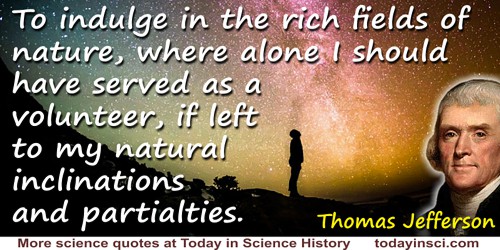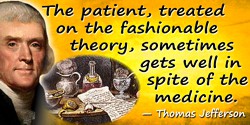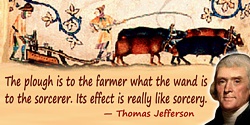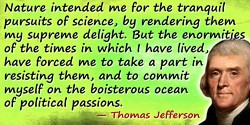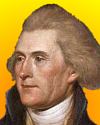 (source)
(source)
|
Thomas Jefferson
(13 Apr 1743 - 4 Jul 1826)
American statesman, astronomer, scholar and inventor who wrote the Declaration of Independence (1776) and organized the Lewis and Clark expedition (1803). His only full-length book, Notes on the State of Virginia contains an outline of the geography, flora and fauna of Virginia, and established his reputation as a scholar and a pioneering American scientist.
|
Thomas Jefferson
“To indulge in the rich fields of nature”
Illustrated Quote - Medium (500 x 250 px)
More Thomas Jefferson quotes on science >>
While serving as the U.S. President (1801–1809), Thomas Jefferson reflected on his abiding enthusiasm for natural history in a letter to Caspar Wistar. Jefferson began the letter, dated 21 Jun 1807, by complimenting the city of Philadephia (where Wistar was a physician and professor of anatomy), for having good facilities to teach his oldest grandson. (The fifteen-year-old teenager, Thomas Jefferson Randolph, was the second child of his daughter, Martha Jefferson and her husband Thomas Mann Randolph, Jr.) Thomas Jefferson was taking “a lively interest” in his education. “We propose, therefore, to send him to Philadelphia to attend the schools of Botany, Natural History, Anatomy, and perhaps Surgery; but not of Medicine.” Then Jefferson revealed that although he respected the study of anatomy, he was sceptical of the practice of medicine with its potions and purgatives.
In the remainder of the letter, Jefferson explained his concerns at length, which he concluded somewhat apologetically to his knowledgeable friend, Professor Wistar, thus:
“The natural course of the human mind is certainly from credulity to scepticism: and this is perhaps the most favorable apology I can make for venturing so far out of my depth, and to one too, to whom the strong as well as the weak points of this science are so familiar. …
At any rate, it has permitted me, for a moment, to abstract myself from the dry and dreary waste of politics, into which I have been impressed by the times on which I happened, and to indulge in the rich fields of nature, where alone I should have served as a volunteer, if left to my natural inclinations and partialities.”
Jefferson signed his letter, saying, “I salute you at all times with affection and respect.”
Read the full letter in Thomas Jefferson on Quack Medicine >>
- Science Quotes by Thomas Jefferson.
- 13 Apr - short biography, births, deaths and events on date of Jefferson's birth.
- Jefferson As A Man Of Science - Preface to The Writings of Thomas Jefferson, Vol. 19.
- Thomas Jefferson on Education and Science from a report on establishing the University of Virginia (1818).
- Thomas Jefferson - context of quote “To indulge in the rich fields of nature” - Large image (800 x 400 px)
- Thomas Jefferson - context of quote “The plough ... is really like sorcery” - Medium image (500 x 250 px)
- Thomas Jefferson - context of quote “The plough ... is really like sorcery” - Large image (800 x 400 px)
- Thomas Jefferson - context of quote “Chemistry … among the most useful of sciences” - Medium image (500 x 250 px)
- Thomas Jefferson - context of quote “Chemistry … among the most useful of sciences” - Large image (800 x 400 px)
- Thomas Jefferson - context of quote “The patient … sometimes gets well in spite of the medicine. ” - Medium image (500 x 250 px)
- Thomas Jefferson - context of quote “The patient … sometimes gets well in spite of the medicine. ” - Large image (800 x 400 px)
- Thomas Jefferson on Quack Medicine - from Letter to Dr. Caspar Wistar (1807)
- Thomas Jefferson - context of quote “Nature intended me for the tranquil pursuits of science” - Medium image (500 x 250 px)
- Thomas Jefferson - context of quote “Nature intended me for the tranquil pursuits of science” - Large image (800 x 400 px)
- Thomas Jefferson - context of quote “The ocean ... like the air, is the common birthright of mankind” - Medium image (500 x 250 px)
- Thomas Jefferson - context of quote “The ocean ... like the air, is the common birthright of mankind” - Large image (800 x 400 px)
- Thomas Jefferson: Scientist, by Edwin Thomas Martin. - book suggestion.
